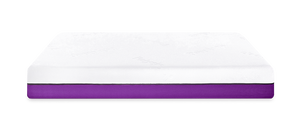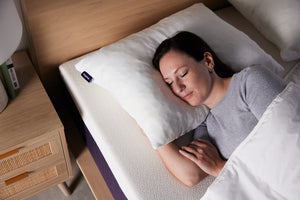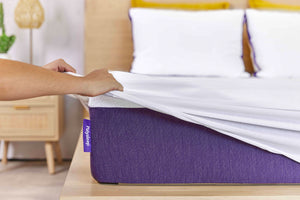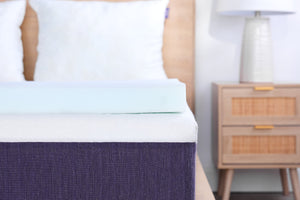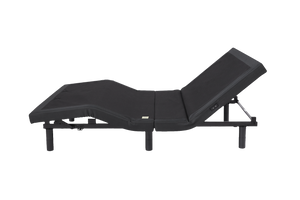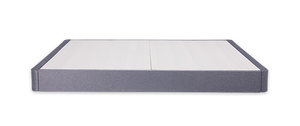If you fail to get proper sleep at night or wake up feeling stiff with aches and pains, your mattress might be to blame!
Ideally, mattresses should last for 7-8 years, but the number can vary with the kind of mattress you own.
Your sleep expert at Polysleep, specialist in mattress in a box in Canada, gives you some advice to know when to change your mattress and how to choose a new one. Keep reading!
How often to replace a mattress?
If your mattress feels lumpy and you often wake up feeling sleepy and tired with body aches, it might be time to invest in a new one.
How often should you change your mattress then?
It can depend on several factors, like the kind of mattress you have and its overall quality of construction.
For instance, if you own a mattress from Polysleep, you can safely keep it for the longest duration possible. Its superior foam support maintains its structure for a long time, while its anti-microbial foam will provide you with a healthier sleeping surface.
How to tell if your mattress needs replacing?
If you want to have a good night's sleep, you need to invest in a high-quality mattress. Even with a good quality mattress, you can find that it does not serve you well after certain years. You might have trouble sleeping or suffer aches and pains after sleeping on an old, lumpy mattress.
So, how often should you replace your mattress?
Ideally, mattresses can last for about 7-8 years. Those having low-quality materials will break much sooner, and those of higher quality and some mattress types can last longer.
Before getting a new mattress, you need to find out whether —
- It is more than six years old and has reached the end of its lifespan.
- It has lost its original shape and has become bent or shaggy in places.
- It is negatively affecting your sleep.
- You wake up sleepy and tired and do not feel rested.
- You sleep better in hotels or when visiting your friend's place than in your bed.
- There is an increase in allergies or asthma in your household.

When you should replace your mattress can depend on its quality, wear and tear, and the material used.
What is the average life of a mattress?
If, while buying a mattress, you are confused about how long should a mattress last, there is no clear-cut answer.
Ideally, a mattress from a well-known brand will last for about 6-8 years. The mattresses are built from different materials and their lifespan are given below.
Latex mattress lifespan
Latex mattresses are usually made from natural latex derived from the sap of a rubber tree. It can have several layers depending on its size and thickness. A good quality latex mattress can last between 10-15 years when well maintained.
Memory foam mattress lifespan
Memory foam mattresses are built from polyurethane foam.
Those like The Zephyr mattress are high-end memory foam mattresses made from layers of foam of varying density and thickness to provide maximum comfort and support.
It uses nano bionic technology and anti-microbial foam to provide the ultimate sleeping experience.
Memory foam mattresses can last for about 8 to 10 years.

Spring mattress lifespan
The springs in the spring mattresses can wear down with time, resulting in sagging issues. A spring mattress can last for about five to seven years if used with care.
Hybrid mattress lifespan
Hybrid mattresses combine the softness of a foam mattress and the sturdiness of a spring mattress. If maintained well, they can last for seven to ten years.
What are the factors that influence your mattress lifespan?
Although you cannot expect your mattress to last forever, certain factors can influence its lifespan:
- Type of mattress: The material of your mattress can affect its lifespan. While high-density memory foam mattresses and natural latex mattresses last about ten to fifteen years, spring and hybrid mattresses fall apart in six to eight years.
- Maintenance: Your mattress will last longer if you take better care of it by regular cleaning and keeping it in a protective covering.
- Weight of sleepers: The sleeper's weight determines how long it will last without sagging. A mattress supporting a heavier weight will sag earlier than that carrying a lightweight person. The extent of use: If used regularly, mattresses need replacing faster than when used sparingly, like in a guest room.

Is buying a new mattress really worth it?
Mattresses must be replaced when they are uncomfortable to sleep in, have lost their shape, or cause skin allergies. It makes sense to replace your mattress when they get old to continue to have a good night's sleep.
If you wonder how often you should replace your mattress, the answer is usually after eight to ten years.
Tips to choose a new mattress
When looking for a new mattress, you need to consider:

- The material of the mattress: If you want more support and bounce and do not want to spend too much, you can use a spring or hybrid mattress. Both provide bounce and support and are suitable for sleepers in any position. Memory foam and latex are higher-end mattresses that provide body contouring, pressure relief and are more durable and comfortable.
- Sleeping position: While back-sleepers and stomach sleepers do well with firm to medium-firm mattresses, side sleepers feel the most comfortable with soft to medium ones.
- Weight and body type: The heavier the weight, the more wear and tear the mattress will face, eventually shortening its lifespan.
Frequently asked questions
If confused about mattresses, here are some facts you need to know:
Why do you need to wait 24-48 hours before sleeping on a new mattress?
It takes 24 hours for memory foam mattresses to ultimately take shape.
Why do mattresses get heavy with time?
With time, mattresses collect dust, dry skin cells, oil, and moisture, making them heavy.
Can old mattresses make you sick?
Old mattresses can be a breeding ground for bacteria and molds and make you prone to allergies. Investing in anti-microbial memory foam mattresses from brands like Polysleep will ensure that your mattress stays germ-free for a long time.
How to know if my mattress is too soft or firm?
Mattress that is too soft can cause difficulty for you to get up from bed. A firm mattress can cause aches and pains, and stiffness in joints.
What happens to a mattress after ten years?
If you own a brand like the Polysleep mattress, your mattress might look new depending on how well you have maintained it. But generally, after the wear and tear of 10 years, your mattress might get bent out of shape, making you search for a new mattress right away.
What happens if you don't change the mattress?
You might suffer from sleeping disorders if you do not change your mattress even when it's past its prime. You might have aches and pains from sleeping on a bumpy mattress and can also suffer from allergies because of dust and mites accumulated in the old one.
Takeaway
Getting a high-quality mattress can be a great way to improve your quality of sleep and enhance your overall health. Take care of your mattress and replace it on time to have a great sleep night after night.







